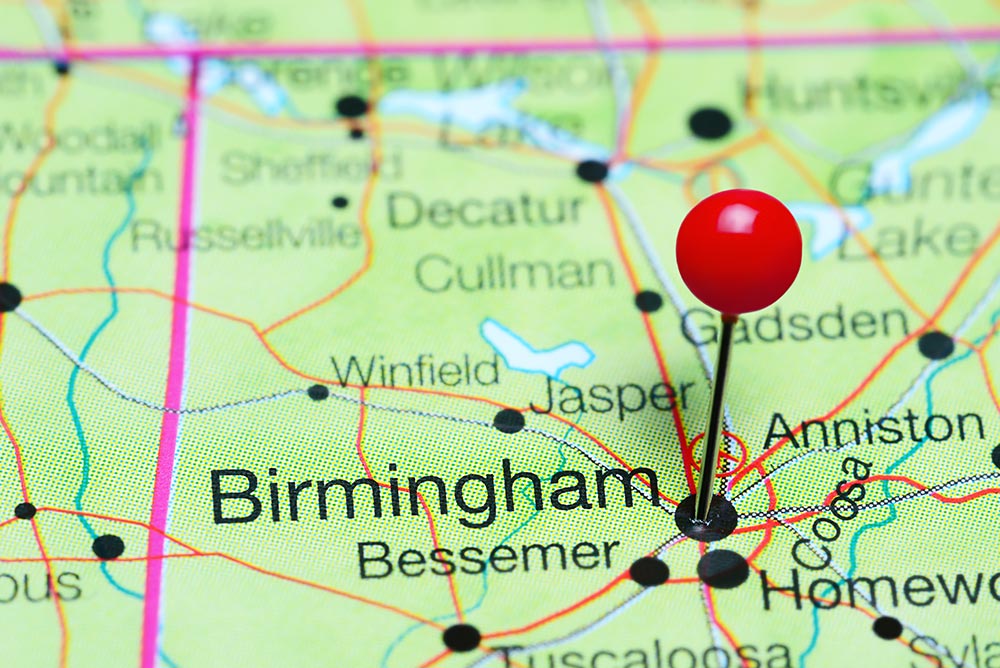“Out of The Box” employs a hands-on approach to the study of history that is designed to educate, engage, and empower participants. Our educational workshops and field studies use placed based interactive strategies to immerse participants in the history of the Modern Civil Rights Movement.
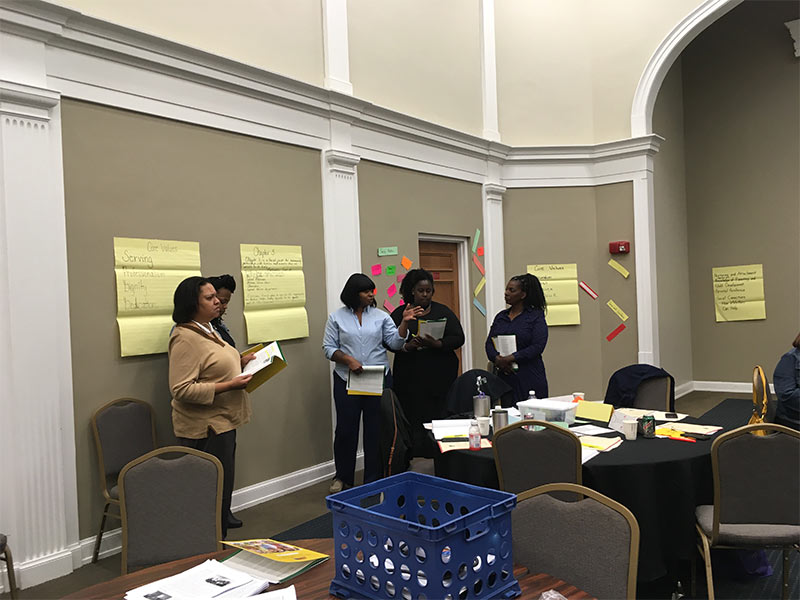
Testimonials
“This experience was fantastic. The field experiences of this institute are once in a lifetime experiences. Getting to visit museums, visit with foot soldiers, and walk over the Edmund Pettus Bridge are things that I will never forget. I have become more aware of the stories of the Civil Rights Movement and the narrative of racial reconciliation. I am excited to share this experience with my students.”
“There has absolutely never been another director like Dr. Martha Bouyer. She is a woman full of knowledge, grace, and passion. Her love for educating others on the history of the role of Alabama during the Civil Rights Movement is simply remarkable, and quite contagious. The program would not have had the same impact if someone else had been the program director. I will forever be grateful for the people, places, and components of history that she has connected me with.”
“The visiting professors and activities were all highly relevant and useful. This was a once in a lifetime experience of being able to meet with the foot soldiers of the Civil Rights Movement and those with the first-hand account of the time. Hearing from Peggy Wallace Kennedy and Ruby Shuttlesworth Bester on the same day will be a treasured memory and one that I will be able to share with my students and other teachers in my department and district.”
“The director is incredibly knowledgeable, knows everyone in the community and has so many wonderful connections that allows us to speak to living history through amazing guests. The visiting faculty was incredibly knowledgeable and insightful, as well as those who have lived through the Civil Rights movement.”
“Everything that was implemented in the institute connected to everything we experienced. Throughout the days we watched videos, traveled, or went to a location where everything interconnected. It gave me confirmation that everything was taught and connected for a reason. We were able to verify and discuss facts with visuals or artifacts that we read about or saw with our own eyes. The lectures, first-hand accounts, and locations gave a broad perspective of everything inclusive of Alabama’s role in the Civil Rights Movement.”
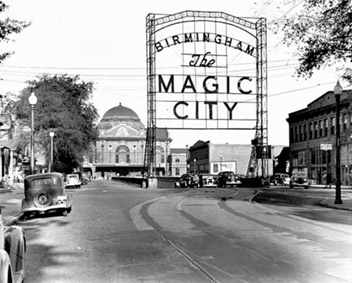
The Magic City sign was erected in 1926 and stood outside of the Terminal Train Station.
“Stony the Road We Trod . . .”Alabama’s Role
in the Modern Civil Rights Movement Field Study Host City – Birmingham
In 1871 the city of Birmingham rose out of the center of a cornfield in Jones Valley to become the industrial capital of the State of Alabama. The surrounding red ore fields, the mountains of black coal, and the rich beds of limestone beckoned newly freed slaves, immigrants from Southern and Eastern Europe, and farmers alike. They all saw an opportunity to make a living in Birmingham. As the iron and steel industries continued to catapult forward, so did Birmingham. The young city grew so quickly that many observers said it happened “just like magic.” Soon the nickname “The Magic City” was applied to Birmingham.
The Civil Rights Years
After a shaky post World War II recovery, Birmingham entered the decade of the 1950s with pots of frustration brewing and boiling over in communities all over the city. Returning African American veterans who had fought for freedom in Europe sought those same freedoms for themselves and their families. Denied equal access and justice in the courts, they sought it in the streets, in organized protest marches, sit-ins, pray-ins, and economic pressure in the form of selective buying campaigns.
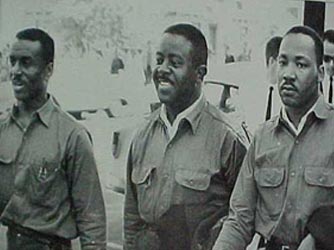
The “Big Three:” Rev. Fred L. Shuttlesworth, Dr. Martin Luther King, Jr., and Rev. Ralph Abernathy.
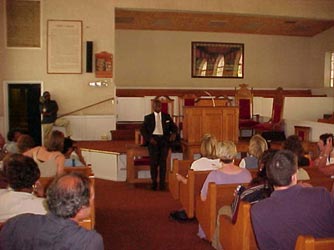
Rev. Shuttlesworth inside Historic Bethel Baptist
Church.
It Began at Bethel
The 1960s brought about events that would forever change the “Magic” of the city. This was the era of police dogs and fire hoses turned on civil rights demonstrators and the bombing of the Sixteenth Street Baptist Church. Because of the events that happened here, in 2017, President Barack Obama established the Birmingham Civil Rights National Monument to document Birmingham’s historic struggle for human and civil rights for African American citizens in Alabama and across the nation.
The recognized leader of the Modern Civil Rights Movement in Birmingham, Alabama was Rev. Fred L. Shuttlesworth and the congregation of the Historic Bethel Baptist Church. Rev. Shuttlesworth attacked segregation at all levels seeking justice in all of its forms including access to public schools, public libraries, job opportunities, the right to vote, the right to seek public office, the right to drink from water fountains, access to public restrooms, the right to be served a meal in restaurants, and the right to be treated fairly and justly in the courts.
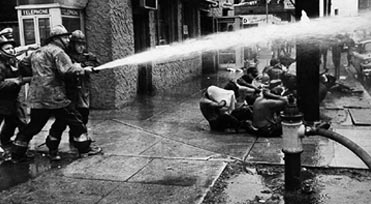
1963, the Birmingham Children’s March
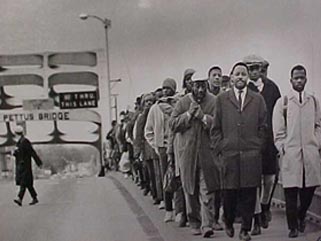
Rev. Hosea Williams and John Lewis lead protestors across the Edmund Pettus Bridge in Selma, Alabama, on March 7, 1965.
Selma, Alabama
As participants in the “Stony the Road We Trod….” Alabama’s Role in the Modern Civil Rights Field Study, our quest for meaning and knowledge will take us from Birmingham to Selma and the foot of the Edmund Pettus Bridge where marchers were attacked by armed deputies for trying to secure the right to vote. Just like in Birmingham, youth in Selma led the way inspiring their parents, teachers, and other professionals to try and register to vote. Their quest for the right to vote will lead to the passage of the 1965 Voting Rights Act.
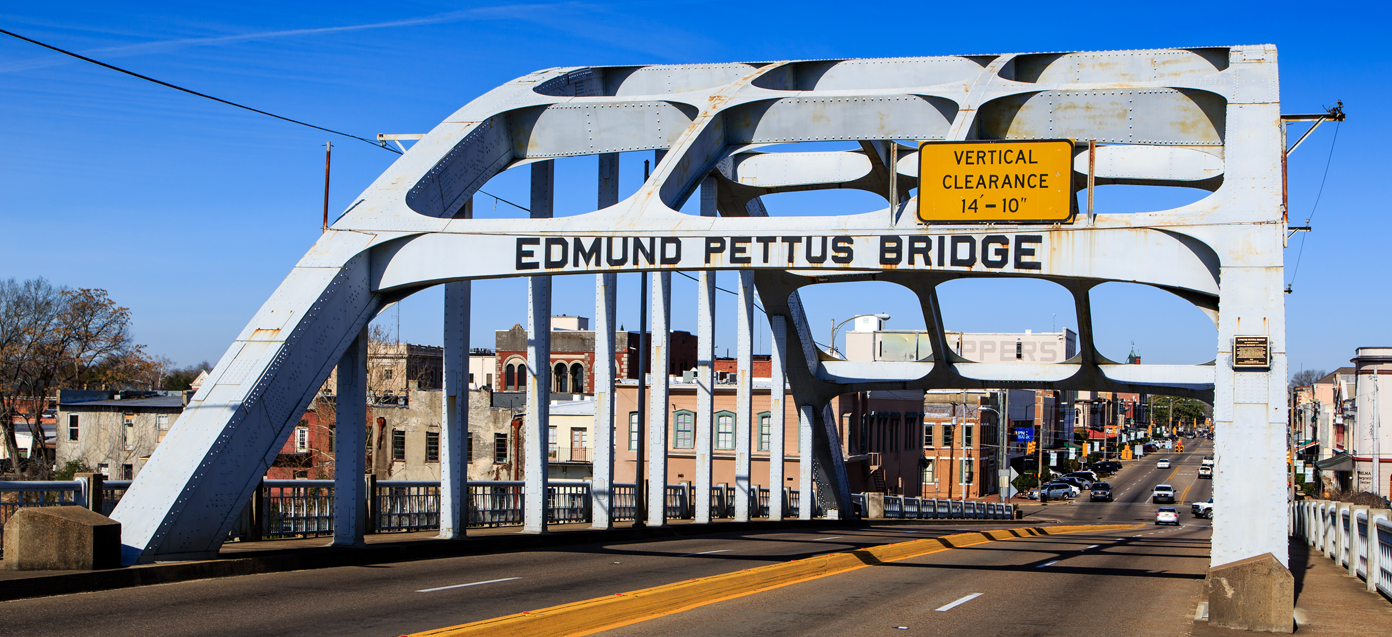
Montgomery, Alabama
Montgomery, the cradle of the Confederacy and the birthplace of the Modern Civil Rights Movement. In Montgomery, participants will visit Dexter Avenue King Memorial Baptist Church, The Dexter Parsonage, The Rosa Parks Museum, The Legacy Memorial and Museum and several other sites of memory related to the struggle for “First Class Citizenship.”

Dexter Avenue King Memorial Baptist Church
Tuskegee, Alabama
Participants will visit Tuskegee, home of the first college for African Americans in Alabama. The college, now Tuskegee University, established by Booker T. Washington, is well known for the agricultural revolution inspired by the work of Dr. George Washington Carver. This city is also the home of The Tuskegee Airmen. We will tour the refurbished training site that prepared the men to serve in the Army Air Corps. Events in Tuskegee, as they relate to voting, caused the nation to enforce the “one man-one vote” principle as a result of Gomillion v Lightfoot. Our last stop in this landmark city will be the Tuskegee History Center where we will learn about other landmark Supreme Court Decisions related to race and equal citizenship.




